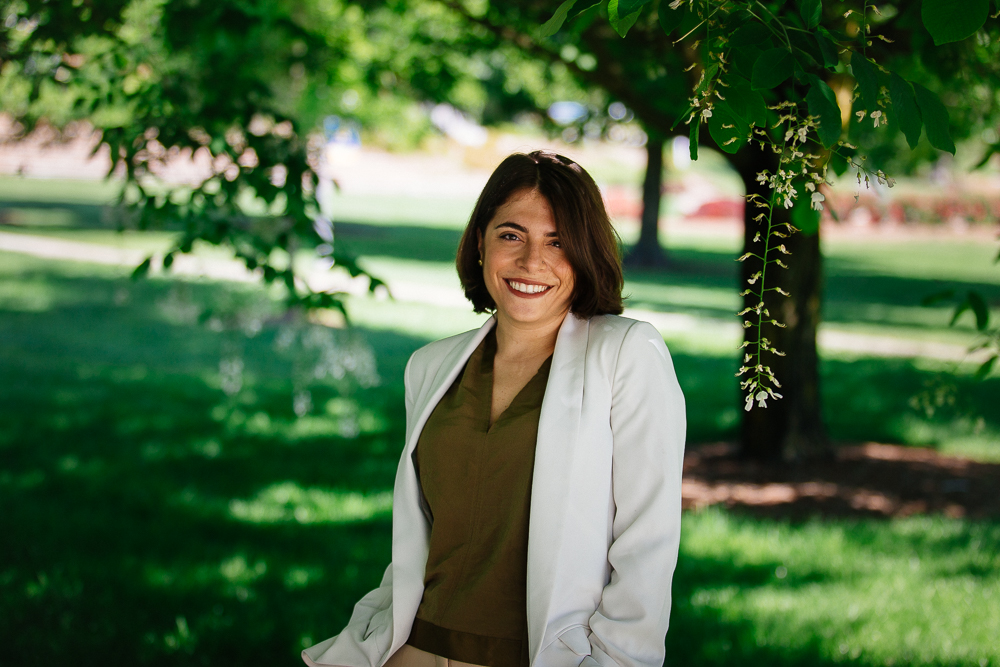By the time Myriam Aziz arrived from Lebanon to start her master’s degree at Eastern Mennonite University’s Center for Justice and Peacebuilding (CJP) in the fall of 2015, the U.S. presidential primary season was already underway. The resettlement of Syrian refugees had become one of its many political footballs, and Aziz was dismayed to hear some Republican candidates say that they wanted to make the vetting process even more rigorous and restrictive.
“I had experienced firsthand who these refugees are and the journeys they had been on,” says Aziz, who spent the two years prior to coming to CJP working with Syrian refugees in Lebanon’s Beqaa Valley, as a registration assistant and a senior resettlement assistant with the UN’s refugee agency, UNHCR. “I was very familiar with the process.”
Hoping to educate local political leaders about how rigorous and time-consuming the resettlement process already was, Aziz joined a group that went to discuss the matter with staff at U.S. Rep. Bob Goodlatte (R-Roanoke). Afterwards, she began thinking about other ways by which she might more effectively introduce Syrian refugees to an American public that often misunderstands them.
“I realized that if they were to see these people, if they were to know them a little bit better before they got here … that might perhaps resonate,” says Aziz, who studied at EMU as a Fulbright scholar.
Arts in Peacebuilding grant funds film
With some grant funding from CJP, Aziz returned to Lebanon in December, 2016, where she filmed interviews with Syrian refugees living in different parts of the country. After spending the next several months editing and translating the footage, she finalized a 25-minute documentary intended to put individual human faces and voices behind what has become a polarizing political issue in the United States.
“When you think of Syrians, you think of us as terrorists, as burdens,” says one young man interviewed in the film. “We are fleeing war. We are attempting to start new lives. Why would we create more problems for ourselves?”
After an initial screening at EMU in April, Aziz is now pursuing a number of ways to make sure as many people as possible are able to see the documentary – including possible showings with congressional staff in Washington D.C.
“My biggest goal behind this video is to get more Syrian refugees resettled in the US,” says Aziz, acknowledging that those prospects for many refugees have grown even dimmer since President Trump took office. “They need us more than ever, because they’re unable to be here to talk themselves. If any Syrians living in the United States would like to collaborate or use this documentary, please don’t hesitate to contact me.”
Teaching fellow position is newly created
As that work continues, Aziz is returning to campus on June 1 to become CJP’s first-ever teaching fellow. During a one-year fellowship, Aziz will teach in the undergraduate peacebuilding and development program, assist with graduate-level CJP courses and help peacebuilding and conflict studies professor Gloria Rhodes to develop a training program on conflict resolution in the workplace.
“Like many of our students, Myriam arrived at CJP with a good deal of field experience,” said Jayne Docherty, CJP academic programs director. “In working with Gloria Rhodes as a teaching assistant, she found she had a gift for teaching as well as a passion for it. Myriam also proved herself to be an able scholar with a flair for reflecting on the realities of working in the field.”
The arrangement will offer benefits to all involved, added Docherty, with Aziz gaining experience as an instructor, undergraduates learning from a recent CJP graduate with distinctive field experience, and the center receiving assistance developing the new training program.
“If this works well, we would like to create a yearly Teaching Fellow position for a recent CJP graduate,” Docherty said.
After finishing the teaching fellowship at EMU, Aziz plans to eventually pursue a PhD and then, a career in the Lebanese Foreign Service.
“I’m very grateful to all the support I’ve received from CJP and EMU,” said Aziz. “I feel like this teaching fellowship will guide me towards a good decision about my future.”
